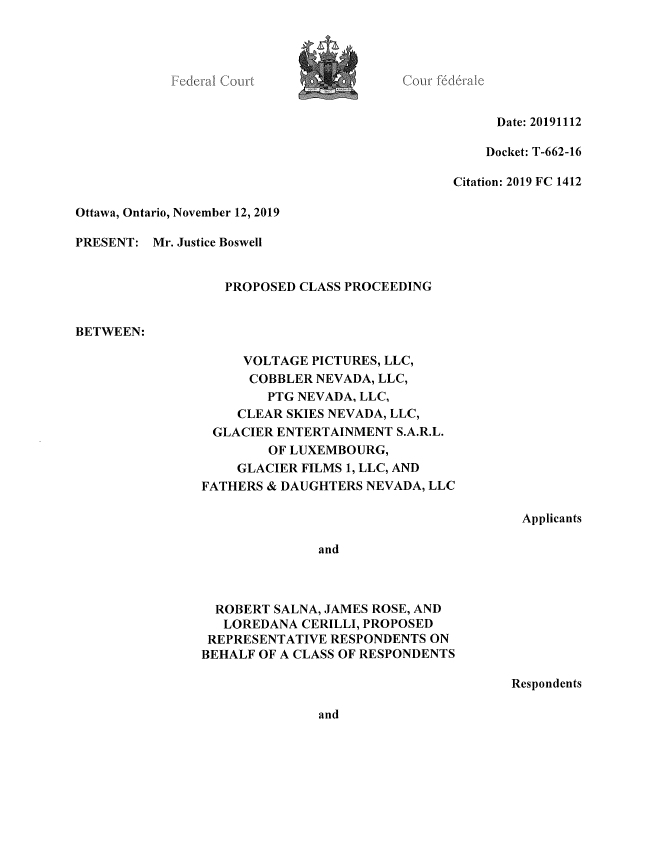Some quick hits on the FCC decision in #VoltagevSalna:
The decision is here: https://cippic.ca/uploads/Voltage_v_Salna-T-662-16-Order_and_Reasons.pdf">https://cippic.ca/uploads/V...
The decision is here: https://cippic.ca/uploads/Voltage_v_Salna-T-662-16-Order_and_Reasons.pdf">https://cippic.ca/uploads/V...
First, Voltage& #39;s motion really came down to two kinds of claims: (1) direct infringement for sharing its movies over BitTorrent, (2) authorizing infringement by providing an internet account to direct infringers.
Other claims were just variations on this theme.
Other claims were just variations on this theme.
At the last moment, Voltage amended its argument to leave out of the class any respondent who was not also an internet subscriber. So now the class included (1) internet subscribers who are direct infringers, and (2) internet subscribers who are authorizing infringers.
The test for certification is laid out in Rule 334.16:
(1) reasonable cause of action plead
(2) identifiable class
(3) common questions of fact or law,
(4) the class is the preferable procedure, and
(5) we have a solid representative respondent.
OK, I& #39;m summarizing a bit here.
(1) reasonable cause of action plead
(2) identifiable class
(3) common questions of fact or law,
(4) the class is the preferable procedure, and
(5) we have a solid representative respondent.
OK, I& #39;m summarizing a bit here.
Voltage lost on all five elements of the test.
On (1) reasonable cause of action plead, the Court was troubled with each theory of liability plead by Voltage. CIPPIC argued that some theories of liability were simply not in the pleadings and others were not supported by a factual framework. The Court agreed @ para 74-83.
We are particularly pleased that the Court rejected Voltage& #39;s expansive theory of authorization liability, which would have exposed schools, coffee shops, and others offering shared internet access to liability.
On (2) identifiable class, the Court was not satisfied with the evidentiary record. Voltage had put in evidence only a single IP address involved in an infringement, and had narrowed it class to exclude 2 of the 3 respondents before it. Not good enough: paras 99-109.
On (3) common questions, the Respondents argued that all we really have in common is questions of copyright ownership and IP collection by Voltage. All else is individualized fact-finding, and kryptonite for a certification motion. The Court agreed at paras 113-125.
On (4) preferable procedure, the court described Voltage& #39;s litigation plan as "unmanageable". A class proceeding wouldn’t work for reasons ranging from the misuse of the ISP notice and notice regime to the lack of resources to fund the respondent. Paras 144-151.
On (5) a suitable representative respondent, the Court observed that the representative respondents lacked the necessary incentives to defend the application with diligence and vigour. Para 155.

 Read on Twitter
Read on Twitter


